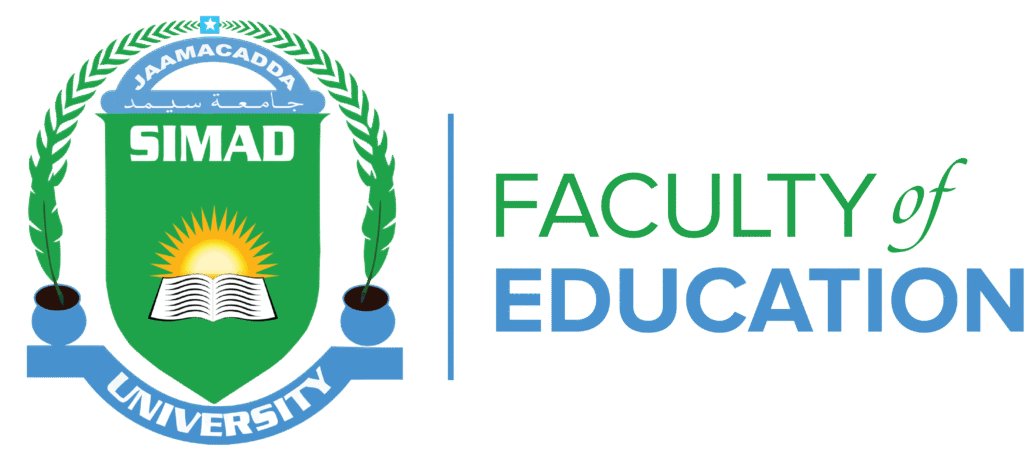Mathematics and Physics
Back in 2013, when SIMAD University’s Faculty of Education was being launched, the Department of Science in Education (Mathematics and Physics) was its first program. Think of it as the pioneering department that started the entire faculty!
This department is dedicated to training the next generation of high school teachers, with a focus on Mathematics and Physics. Their big goal? To “Advance Scientific Excellence for Global Impact.” In simpler terms, they aim to cultivate strong science leaders who can make a tangible difference, both in Somalia and globally.
How do they do this? By providing students with a solid foundation in both the theoretical and practical aspects of Math and Physics. They don’t just learn from books; they know how to solve real problems and think like scientists and educators. The department combines rigorous academic training with hands-on skills and cutting-edge research.
The big idea is to bridge the gap between classroom learning and real-world challenges. By doing this, they aim to nurture Somalia’s future scientists, innovators, and especially great math and physics teachers who can inspire others.
- Completion of secondary school with a minimum overall average of 50%
- Should bring the original and a copy of secondary school certificate
- Should bring Six (6) passport size photos with white background
- Should bring the original copy of a letter of good conduct issued by your secondary school
- Should bring a sponsorship letter from your guardian
- Should successfully pass an admission interview and/or test
- Pay non-refundable Processing and ID card fees of USD $50 (bank draft)
Semester One
PHY 1101: Classical Mechanics – 3 Credits
MTH 1102: Pre-Calculus – 3 Credits
ELS 1103: English Language I – 3 Credits
EDU 1101: Study Skills – 2 Credits
IST 1101: Fundamentals of Computing – 2 Credits
ARB 1101: Arabic I – 2 Credits
SLM 1101: Islamic Studies I – 2 Credits
EDU 1201: Somali Studies – 2 Credits
Semester Two
PHY 1201: Properties of Matter – 3 Credits
MTH 1201: Calculus I – 3 Credits
MTH 1202: Analytic Geometry and Algebra – 3 Credits
EDU 1201: Introduction to Education – 3 Credits
EDU 1202: Introduction to Psychology – 3 Credits
ELS 1204: English Language II – 3 Credits
IST 1202: Computer Application and Technology – 3 Credits
EDU 1204: Critical Thinking – 2 Credits
PSC 1129: Conflict Resolution – 2 Credits
Semester Three
PHY 2101: Heat and Thermodynamics – 3 Credits
MTH 2101: Calculus II – 3 Credits
MTH 2102: Linear Algebra – 3 Credits
EDU 2101: Psychology of Human Learning and Instruction – 3 Credits
EDU 2102: General Methods of Teaching – 3 Credits
ELS 2105: English Skills – 3 Credits
ARB 2102: Arabic Language II – 3 Credits
Semester Four
PHY 2201: Electromagnetism – 3 Credits
MTH 2201: Differential Equations – 3 Credits
MTH 2201: Set Theory and Logic – 3 Credits
EDU 2201: Education Management and Administration – 3 Credits
ELS 2204: Communication Skills – 3 Credits
MTH 2103: Descriptive Statistics and Probability Theory – 3 Credits
SLM 2202: Islamic Studies II – 3 Credits
Semester Five
PHY 3101: Waves and Optics – 3 Credits
MTH 3101: Multi-Variable Function – 3 Credits
MTH 3102: Partial Differential Equations – 3 Credits
MTH 3103: Statistics and Probability II – 3 Credits
EDU 3101: Strategies and Practices in Teaching – 3 Credits
EDU 3102: Educational Planning – 3 Credits
Semester Six
PHY 3201: Solid State Physics – 3 Credits
MTH 3201: Vector Analysis – 3 Credits
MTH 3202: Discrete Mathematics – 3 Credits
MTH 3203: Number Theory – 3 Credits
EDU 3201: Instructional Technology – 3 Credits
RHM 4108: Research Methods – 6 Credits
EDU 4217: School Practice I – 6 Credits
Semester Seven
PHY 4101: Nuclear Physics – 3 Credits
MTH 4101: Numerical Analysis – 3 Credits
MTH 4102: Real Analysis – 3 Credits
MTH 4103: Mathematical Methods – 3 Credits
EDU 4101: Guidance and Counseling – 3 Credits
EDU 4102: Curriculum Studies – 3 Credits
Semester Eight
PHY 4201: Quantum Mechanics – 3 Credits
MTH 4201: Complex Functions – 3 Credits
MTH 4202: Mathematical Logic – 3 Credits
MTH 4203: Applied Mathematics – 3 Credits
EDU 4201: Comparative Education – 3 Credits
EDU 4202: Evaluation of Teaching and Learning – 3 Credits
Research Project – 3 Credits
EDU 4218: School Practice II – 6 Credits
Five years
$ 115 in each semester
The SU academic year consists of 42 weeks split into two semesters of 18 weeks each, the first beginning in August.
Career Opportunities in Somalia
Graduates are highly sought-after as secondary school teachers in public and private schools across Somalia, addressing the critical shortage of qualified STEM educators. They also qualify for roles as subject specialists in regional education ministries, curriculum developers for national education boards, and teacher trainers in colleges. Opportunities exist in technical fields such as data analysis, engineering support, and research coordination in NGOs, telecommunications, or renewable energy projects that require a strong foundation in math and physics.
Global Career Pathways
Internationally, graduates can pursue teaching positions in international schools (especially where STEM teachers are in high demand) or qualify for graduate studies in education, applied mathematics, physics, or engineering. Their analytical training opens doors to entry-level STEM roles in tech companies, research labs, or science communication. With additional certifications, they may enter educational technology, scientific publishing, or corporate training sectors worldwide.
Shared Opportunities (Local & Global)
All graduates leverage their problem-solving skills for roles in:
- Educational consulting (designing STEM programs)
- Science outreach coordination (museums, NGOs)
- Remote data/science tutoring (online platforms)
- Government policy advising (education/innovation sectors)
Entrepreneurship
Graduates can establish private tutoring centers, STEM-focused schools, or EdTech startups creating localized learning resources, addressing gaps in Somalia’s education market while scaling solutions globally.
